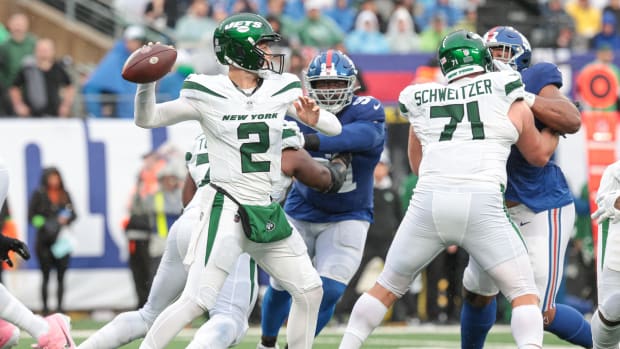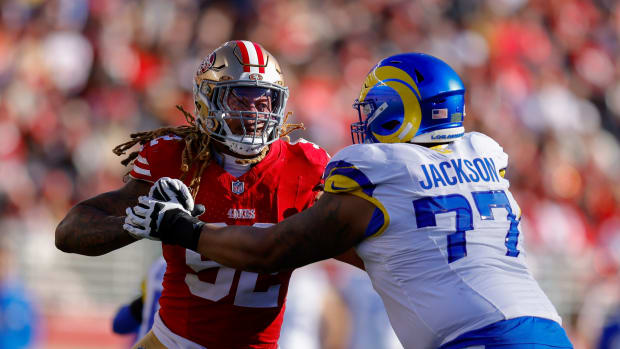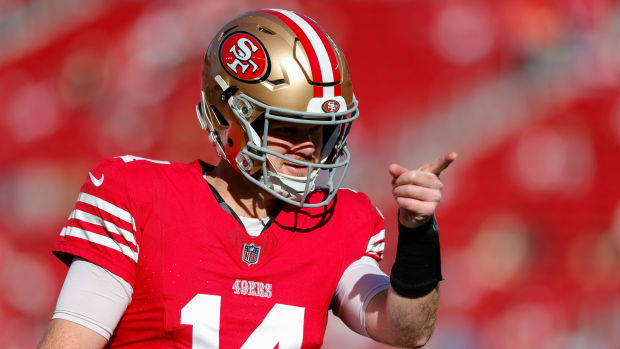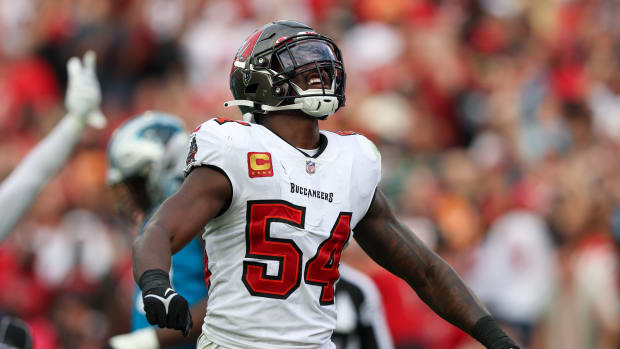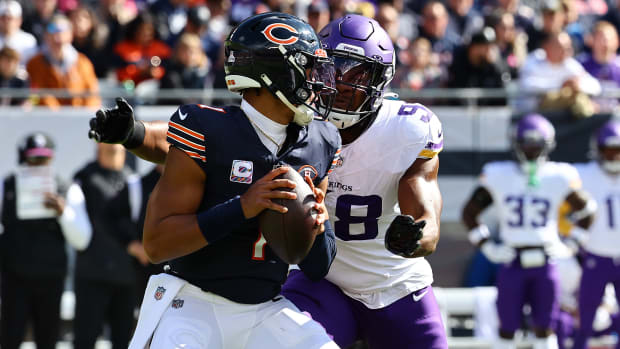Josh Brown: Another NFL Failure on Domestic Violence
“There is no place for domestic violence in our sport or our society, and we are committed to doing our part to prevent such heinous acts going forward.”
— Giants owner John Mara, Sept. 10, 2014
The NFL is on the clock now. And the Giants are too.
In less than 48 hours, one of the league’s marquee franchises will take the field at London’s Twickenham Stadium for a date designed to showcase this great sport of ours to an international audience. Back home, the game will kick off at 9:30 ET to a national audience. It’s the first pro football game pitting a New York team against a Los Angeles team in 22 years. It’ll be broadcast on the league’s network.
What will the discussion be then?
Will it be how the Giants are still hanging on to Josh Brown? Will it be that the league is still looking into his domestic-violence problems? Or will it be that the team came to its senses and dropped the ax on its kicker, who was left home and inactive for the London game? Or that the NFL made Brown ineligible to play for anyone by sticking him on the commissioner’s exempt list, which was created specifically for a situation like this one.
I know all of that matters now. But I’m here to tell you it shouldn’t.
Two years ago, the biggest problem for the NFL was created by its long-standing reluctance to lean on that little thing that your mom and dad instill in you at an age you can’t remember: the ability to separate right from wrong. Instead, the Ray Rice case, and then the Greg Hardy and Adrian Peterson cases after it, became about crisis management and public relations.
Proof? A court found that Rice, in a June 2014 interview with the league, was completely forthcoming about the altercation with his then-fiancée Janay in an Atlantic City elevator the previous February, and it was after that interview that the NFL suspended Rice for two games. The following September, when video was released showing Rice doing what he had told NFL investigators he’d done, the Ravens cut him and the league suspended him indefinitely. He hasn’t played football since.
The Sunday before that video came out, Hardy played for the Panthers despite having been convicted that summer of assaulting a woman. Six days later he was a late scratch for Week 2. Carolina coach Ron Rivera, asked the reason, said the “climate has changed.” Hardy didn’t play again until the following October. Peterson’s situation came to light that week too, and, like Hardy, he didn’t suit up again all year.
The bottom line is that the actions of those three were not the agents of change. No—it was a grainy piece of surveillance video, and the resulting national outrage, that resulted in league action. Only when the public had the visual did the outcry become widespread, and only when the public outcry became widespread did the league get serious about the abuse of women and children.
I think we all hoped it’d be different the next time around, with the league carrying the newly instituted hammer of a six-game suspension for first-time offenders. I personally hoped that the next time around, it would be right and wrong governing the decision-making, rather that how the pitchfork-and-torch crowd on Twitter reacted.
And now, I feel like a rube for buying into that idea.
Here’s what we know about Brown’s situation (and we can certainly speculate that things are even worse than what we know): The NFL and the Giants looked into a May 2015 domestic incident between Brown and his then-wife, Molly. On the 26th of that month the league put in an open-records request with King County (Wash.). Eight months later NFL security was called to help defuse another domestic dispute involving Brown and his wife.
Just before the 2016 draft, the Giants signed Brown to a two-year, $4 million deal. In August, more information surfaced indicating that Molly (by this time his ex-wife) told police he had been physically violent with her on more than 20 occasions, that she sought a protection order against him in 2013, and that law enforcement had been called by Molly Brown to the family’s residences in three different states.
The league’s stance at that time was that the information wasn’t new. A Lisa Friel-led investigation had been stymied by the refusal of Brown’s ex-wife and police to participate, and the only piece of hard evidence the league had was a photo of faint bruising on her wrists, which they were told was a result of Brown having to restrain Molly. Those were the “mitigating factors” in knocking the penalty from six games down to one.
So—at the very least—the Giants re-signed a player who’d had two domestic run-ins within the year, and the NFL’s investigative arm failed to find the fire in a thick cloud of smoke. Meanwhile, Brown got $525,000 in bonus money and has collected six game checks at $67,820 a pop.
So much for there being “no place” for domestic violence in football
And then there was what John Mara told WFAN’s Mike Francesa late Thursday afternoon—Brown “admitted to us that he’d abused his wife in the past. I think what’s a little unclear is the extent of that.”
If your head is spinning, join the club.
If you’re angry, you should be.
Based on his actions and the journal entries released in the last 24 hours, it’s clear that Brown is a sick man. If the Giants wanted to help him, I’d understand it. In fact, you could even see fit to applaud it. That goes for the NFL too, which did a creditable job years ago in such efforts with Michael Vick and Donte' Stallworth.
But if you said there’d be zero tolerance, as Mara did two years ago, and the player told you face-to-face that he stepped over that line, you can’t put him on your football team. And if you set the bar at six games, and there’s that much noise, you can’t cut the player slack and give him one game.
I don’t care if the guy’s a kicker or a quarterback. I don’t care if you’re New York or Jacksonville. I don’t care what broadcast window the guy is playing in, or what stage he’s about to take.
None of that should matter. Because two years ago we were told it was a new day for the NFL. The league had come clean on its missteps and pledged to do better.
That mulligan is gone.
Question or comment? Email us at talkback@themmqb.com.


































